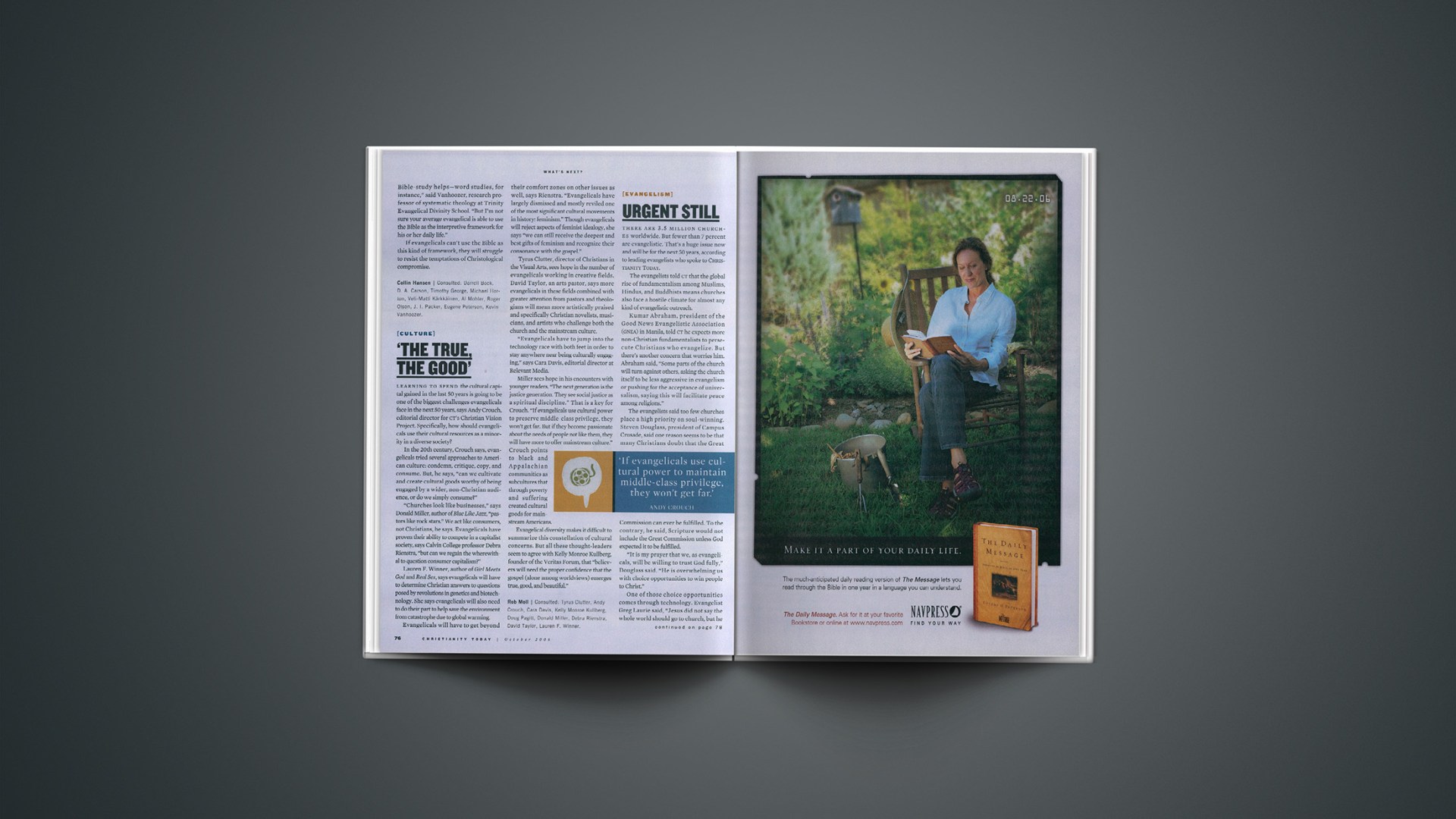We’ve asked 114 leaders from 11 ministry spheres about evangelical priorities for the next 50 years. Here’s what they said about culture.
Learning to spend the cultural capital gained in the last 50 years is going to be one of the biggest challenges evangelicals face in the next 50 years, says Andy Crouch, editorial director for ct’s Christian Vision Project. Specifically, how should evangelicals use their cultural resources as a minority in a diverse society?
In the 20th century, Crouch says, evangelicals tried several approaches to American culture: condemn, critique, copy, and consume. But, he says, “can we cultivate and create cultural goods worthy of being engaged by a wider, non-Christian audience, or do we simply consume?”
“Churches look like businesses,” says Donald Miller, author of Blue Like Jazz, “pastors like rock stars.” We act like consumers, not Christians, he says. Evangelicals have proven their ability to compete in a capitalist society, says Calvin College professor Debra Rienstra, “but can we regain the wherewithal to question consumer capitalism?”
Lauren F. Winner, author of Girl Meets God and Real Sex, says evangelicals will have to determine Christian answers to questions posed by revolutions in genetics and biotechnology. She says evangelicals will also need to do their part to help save the environment from catastrophe due to global warming.
Evangelicals will have to get beyond their comfort zones on other issues as well, says Rienstra. “Evangelicals have largely dismissed and mostly reviled one of the most significant cultural movements in history: feminism.” Though evangelicals will reject aspects of feminist idealogy, she says “we can still receive the deepest and best gifts of feminism and recognize their consonance with the gospel.”
Tyrus Clutter, director of Christians in the Visual Arts, sees hope in the number of evangelicals working in creative fields. David Taylor, an arts pastor, says more evangelicals in these fields combined with greater attention from pastors and theologians will mean more artistically praised and specifically Christian novelists, musicians, and artists who challenge both the church and the mainstream culture.
“Evangelicals have to jump into the technology race with both feet in order to stay anywhere near being culturally engaging,” says Cara Davis, editorial director at Relevant Media.
Miller sees hope in his encounters with younger readers. “The next generation is the justice generation. They see social justice as a spiritual discipline.” That is a key for Crouch. “If evangelicals use cultural power to preserve middle-class privilege, they won’t get far. But if they become passionate about the needs of people not like them, they will have more to offer mainstream culture.” Crouch points to black and Appalachian communities as subcultures that through poverty and suffering created cultural goods for mainstream Americans.
Evangelical diversity makes it difficult to summarize this constellation of cultural concerns. But all these thought-leaders seem to agree with Kelly Monroe Kullberg, founder of the Veritas Forum, that “believers will need the proper confidence that the gospel (alone among worldviews) emerges true, good, and beautiful.”
Rob Moll | Consulted: Tyrus Clutter, Andy Crouch, Cara Davis, Kelly Monroe Kullberg, Doug Pagitt, Donald Miller, Debra Rienstra, David Taylor, Lauren F. Winner.
Copyright © 2006 Christianity Today. Click for reprint information.
Related Elsewhere:
We continue our look at what evangelical leaders think are the priorities for the next 50 years in 11 categories: local church, youth, missions, politics, publishing/broadcasting, theology, evangelism, higher education, international justice and relief and development.
Christianity Today‘s other articles on its 50th anniversary include:
Where We Are and How We Got Here | 50 years ago, evangelicals were a sideshow of American culture. Since then, it’s been a long, strange trip. Here’s a look at the influences that shaped the movement. By Mark A. Noll (Sept. 29, 2006)
Sidebar: ‘Truth from the Evangelical Viewpoint’ | What Christianity Today meant to the movement 50 years ago. (Sept. 29, 2006)










